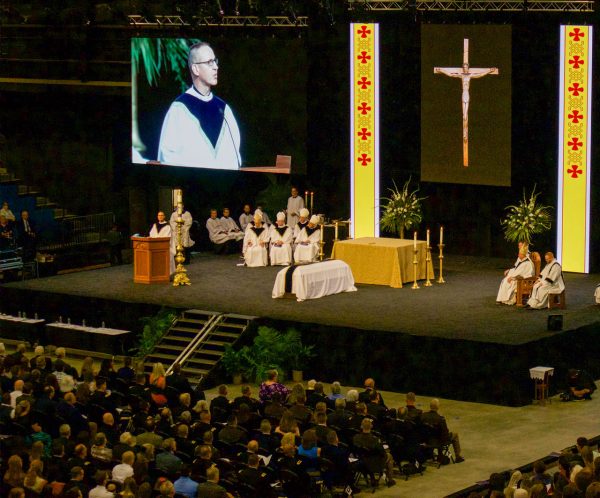Ex-POW shares memories of Fr. Kapaun

Fr. Matthew Pawlikowski, a retired senior chaplain of the West Point Military Academy, reads a letter written by Col. Mike Dowe.
Fr. Matthew Pawlikowski, a retired senior chaplain of the West Point Military Academy, shared remarks written by Col. Mike Dowe at the end of Fr. Emil Kapaun’s funeral liturgy Sept. 29 in Hartman Arena in Park City, Kansas.
Dowe started the letter by saying he’s sure he is the only one in the building who could say he spent several months sleeping next to a saint.
The former POW wrote about being overrun and captured by Chinese soldiers a few days after hearing the shelling of U.S. troops southeast of his location in Korea that resulted in the capture of Fr. Emil Kapaun.
After the group of POWs that included Fr. Kapaun joined them, Dowe said, the Chinese Communists turned us over to the North Koreans “for what was to be a death march of a couple of weeks to our first POW camp.”
POWs who were able carried their wounded comrades, he wrote, because if any POW dropped back, he would be shot by an enemy soldier.
One of the officers who organized soldiers to make stretchers to carry wounded men against their captors’ demands, Dowe said, was Fr. Kapaun.
Dowe meets Fr. Kapaun
A couple of weeks later, after the U.S. bombed a town near where the prisoners were located, Dowe said the prisoners were ordered to march to the southeast. On the other end of the stretcher he was carrying during the march was Fr. Kapaun.
“Father, I’ve heard of you,” Dowe said. “His reply was: Well, please don’t tell my bishop! He doesn’t know I’m here.”
After a march of several days, they arrived at a location where they would spend November through January in one of the coldest winters in North Korean history. The POWs had to survive temperatures of 20 to 40 degrees below zero – in summer clothes.
Dowe then described Fr. Kapaun’s efforts to care for his fellow soldiers’ physical, emotional, and spiritual needs.
Fr. Kapaun would steal food for his men, share a puff from his pipe and “talk to them about the importance of maintaining their faith in God. their country, and each other – and then he would move on.”
Fr. Kapaun helped keep soldiers alive
Dowe said the death rates in two nearby POW camps were much higher than the death rate in his camp because of the way Fr. Kapaun instilled a will to live among the troops.
Nonetheless, he said, fewer than 1,000 of the 2,000 POWs survived that winter. And burying the dead in a frozen environment was extremely difficult.
“Father would volunteer for these horrible details, bring any good clothing back with him, wash it, and distribute it to the living in his rounds,” Dowe said.
He then shared several other stories about how Fr. Kapaun aided his fellow officers and built up morale.
A possible miracle
Dowe talked about one incident he believes was a miracle.
A fellow officer, Dick Hagen, who had been having theological discussions with Fr. Kapaun became ill with dysentery and pneumonia, Dowe said.
“He asked us to get Father. Father was off on his rounds and before we could find him, Dick passed away,” he said. “It was well over an hour later when Father was located and brought back to our huts and told that Dick had been asking for him. Father sat down on the floor next to Dick, put his head in his lap. Dick came back to life while Father administered the last rites. And Dick then immediately died a happy death.”
Dowe then described an Easter service held in defiance of their captors and how Fr. Kapaun later collapsed because of a blood clot and contracted pneumonia.
Fr. Kapaun taken away to die
When the prison officials found out about Fr. Kapaun, he was taken away to die.
“Guards came with fixed bayonets despite the protests of our doctors who insisted Father was recovering,” Dowe said. “When those of us around started to react, Father personally calmed us. I was in tears when he said to me, Mike, don’t be sad. I’m going where I always wanted to go. And when I get there, I’ll be praying for you all.”
He died, or rather was killed (because of neglect), Dowe said, a day or so later.
After the war, an agreement with North Korea was reached to recover buried bodies. Most of the bodies were in mass graves.
“Amazingly, there was one person buried separately near the death house instead of being thrown into the mass grave. And this singular grave is mysterious. The person who was buried in that separate grave has only recently been positively identified as Fr. Kapaun. He is with us here today.”
No one can explain why he was the only person buried separately, he said.
Dowe said after the war, he wrote a magazine article about Fr. Kapaun and was assigned to duties in the Pentagon related to POW matters – one of which was studying the armed forces Code of Conduct.
“The example father’s work and life in the camp became the basis of today’s Code of Conduct for our armed forces,” he said. “So whether people knew his name or not, Father has been shaping the character of service members in all the branches of our armed forces for the past 70 years. I hope after today, many more people will now know his name and the character of this amazing saintly man.”
Dowe concluded his letter by saying he looks forward to seeing in heaven his friend, United States Army Chaplain Fr. Emil Joseph Kapaun.
